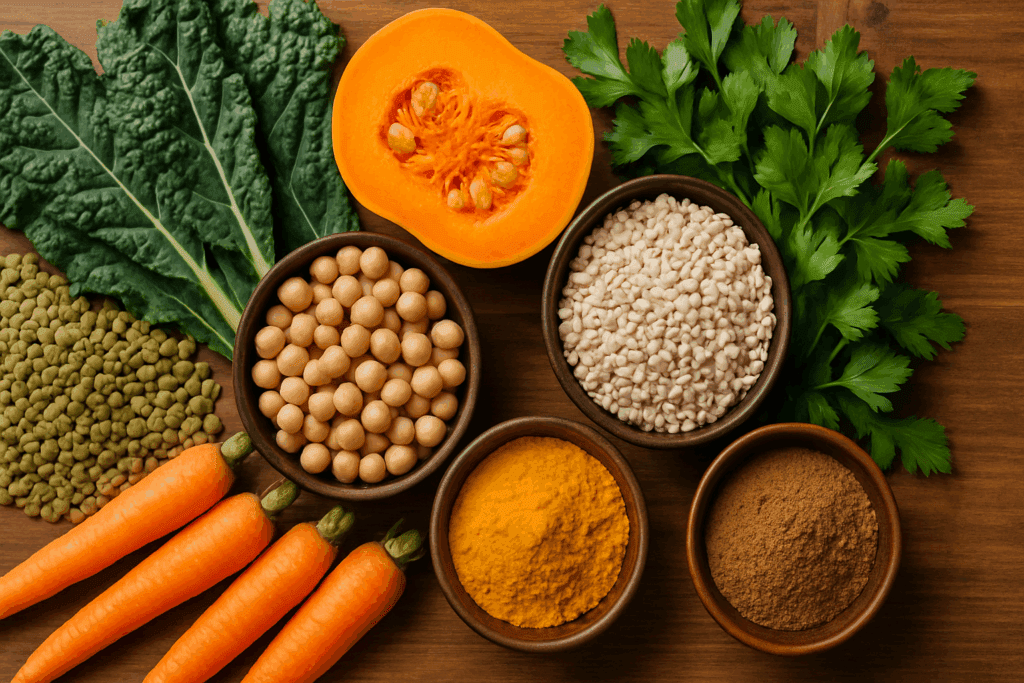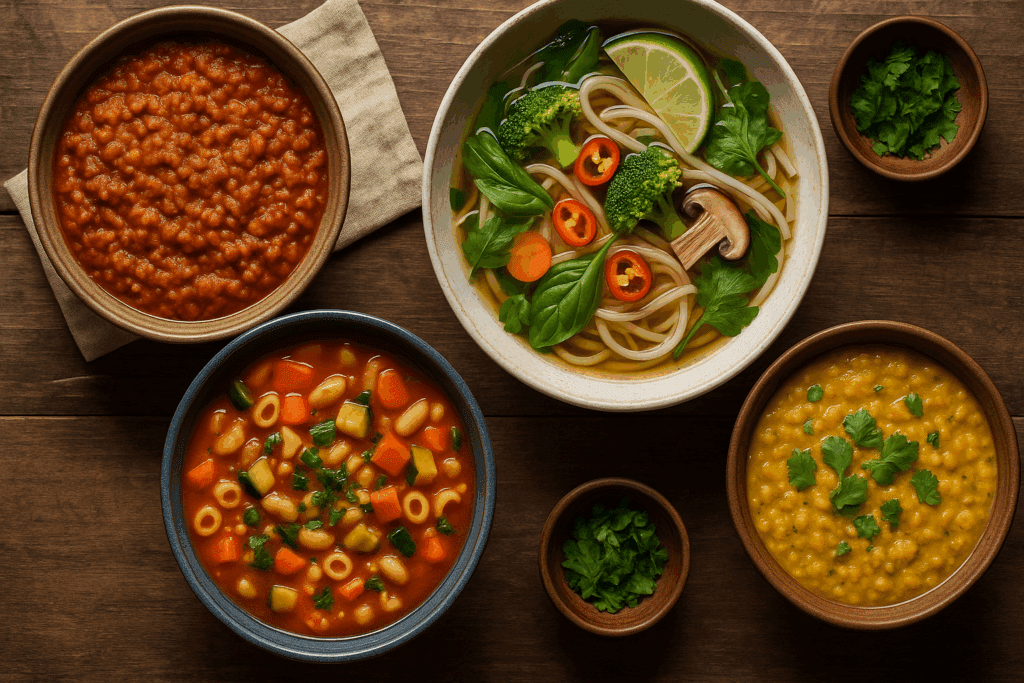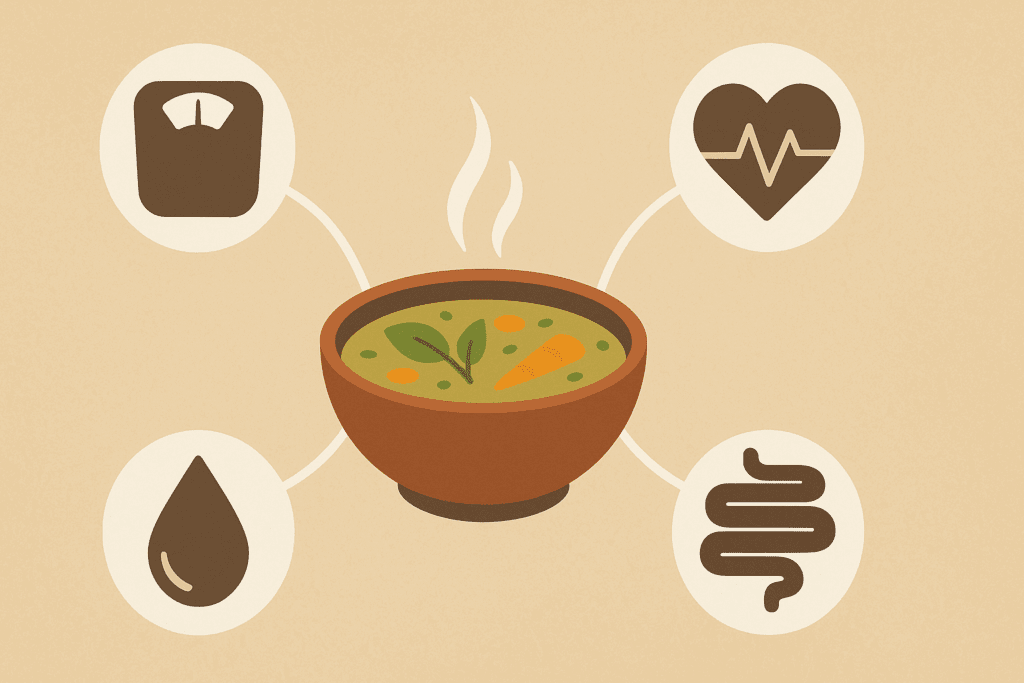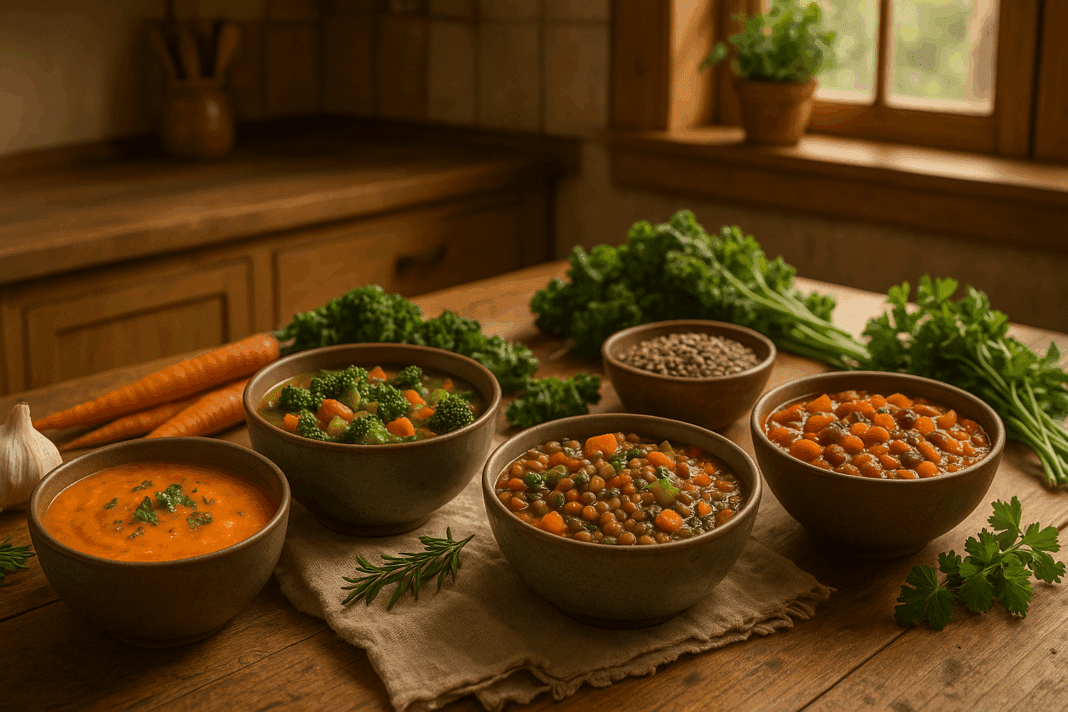As temperatures drop or daily demands leave us longing for nourishment, there’s something deeply comforting about a warm bowl of soup or a hearty stew. Beyond simple comfort, these dishes can be powerhouses of nutrition—especially when prepared with whole food, plant-based ingredients. In fact, plant based soups and stews have emerged as go-to meals for those seeking sustainable weight loss, improved digestion, immune support, and culinary satisfaction. Their versatility, affordability, and ability to incorporate a broad spectrum of vegetables, legumes, and spices make them an ideal centerpiece for a healthy lifestyle grounded in plant-based nutrition.
You may also like: Healthy Plant-Based Dinners Made Easy: Best Whole Food Plant-Based Recipes for Beginners and Beyond
But these soul-soothing dishes offer more than just warmth and fullness. For those seeking meals that align with both wellness goals and scientific principles of healthy eating, plant-based soups and stews deliver a unique trifecta: flavor, fullness, and metabolic support. This article explores how and why these meals are so effective, backed by research and real-world application. It also provides a carefully curated vegan soup list, highlighting ingredients that promote satiety and metabolic health without sacrificing taste. Whether you’re new to plant-based eating or a seasoned pro looking for fresh ideas, this guide is your invitation to stir the pot—literally and figuratively—for a better, healthier you.

The Nutritional Power of Plant-Based Soups and Stews
One of the most compelling features of plant based soups and stews is their ability to deliver a dense array of nutrients in a single, warming bowl. Unlike many processed foods or even seemingly healthy options that rely on added oils or animal fats, these dishes draw their nutrition from whole, minimally processed ingredients. Legumes like lentils and chickpeas bring protein and fiber, root vegetables offer complex carbohydrates and antioxidants, and leafy greens contribute vital micronutrients like magnesium, potassium, and vitamin K.
Fiber is one of the unsung heroes in this story. Diets high in fiber are consistently linked with lower body weight, reduced cholesterol, and more stable blood sugar levels. Plant-based soups and stews are a natural vehicle for fiber, especially when prepared with ingredients like barley, beans, kale, and squash. These components not only help you feel full but also regulate digestion and promote a healthy gut microbiome—an emerging area of interest in metabolic health.
What makes these meals so nutritionally unique is their adaptability. With just a few tweaks, a vegetable broth can evolve into a protein-rich lentil stew or a creamy bisque thickened with puréed cauliflower. Spices such as turmeric, cumin, and ginger can transform a simple dish into a functional food, supporting anti-inflammatory pathways and enhancing absorption of key nutrients. This versatility ensures that plant based soups and stews remain exciting while also delivering consistent health benefits.
Why Warm Meals Promote Satiety and Metabolic Health
The warmth of a meal does more than comfort the soul—it also plays a physiological role in how we digest and metabolize food. Research suggests that warm foods tend to slow eating speed, giving your body more time to register fullness. This is crucial in the context of weight management. Unlike cold, processed meals that are often consumed quickly and mindlessly, vegan soups and stews encourage a slower, more deliberate pace that aligns with natural satiety signals.
Beyond behavioral cues, the physical warmth of these meals may support optimal digestion. Warm foods can stimulate digestive enzymes and encourage better blood flow to the gut, allowing for more efficient nutrient absorption. This is especially important when consuming high-fiber meals, as effective digestion ensures that you reap the full benefits of the foods you eat. When you combine the slow-release energy of legumes and whole grains with the hydrating properties of broth-based meals, the result is a dish that keeps you feeling full longer—without the need for added calories or fat.
From a hormonal perspective, plant-based soups and stews may also help regulate ghrelin and leptin, the hormones responsible for hunger and fullness. By prioritizing meals that are high in volume and low in energy density, you encourage your body to respond more accurately to hunger cues. The inclusion of low-glycemic ingredients like beans, lentils, and sweet potatoes further stabilizes blood sugar, preventing the crashes that often lead to overeating or sugar cravings later in the day.

Building the Perfect Plant-Based Soup: Key Ingredients for Fullness
Creating a plant-based soup that satisfies hunger while supporting weight loss involves more than just tossing vegetables into a pot. The key is to balance fiber, protein, and healthy fats in a way that promotes satiety without excess calories. Start with a flavorful broth base—either homemade or low-sodium vegetable stock—to set the foundation. From there, layering in legumes like black beans, navy beans, or green lentils adds a plant-based protein boost that enhances satisfaction.
Whole grains such as farro, brown rice, or quinoa provide slow-digesting carbohydrates that contribute to lasting energy. Unlike refined grains, these complex carbohydrates maintain their natural fiber content, which plays a critical role in digestive health and blood sugar control. Vegetables like carrots, celery, and zucchini bring not only texture and color but also a spectrum of micronutrients and antioxidants. Leafy greens such as spinach or Swiss chard can be stirred in at the end for a burst of freshness and a dose of iron, folate, and calcium.
Don’t underestimate the role of herbs and spices. A dash of smoked paprika can add depth, while thyme and rosemary bring earthy complexity. Ginger, garlic, and turmeric not only enhance flavor but also contribute anti-inflammatory properties. To add a creamy texture without dairy, try blending part of the soup with white beans or cooked cauliflower, which offers silkiness and structure with minimal calories. When thoughtfully constructed, vegan soups and stews become deeply nourishing meals that satisfy on every level—taste, texture, and nutrition.

The Role of Soups and Stews in a Sustainable Weight Loss Strategy
Weight loss is often framed around restriction and deprivation, but plant based soups and stews offer a refreshing departure from that narrative. These meals align with a more holistic and sustainable approach, emphasizing nourishment and abundance rather than calorie counting or exclusion. Because they are typically low in calorie density but high in volume, they allow individuals to eat until full while still maintaining a calorie deficit—an essential dynamic for fat loss without hunger or frustration.
Satiety is the linchpin of any successful weight loss effort. When you’re hungry, willpower becomes a finite resource, and even the best intentions can falter. Vegan soups and stews help circumvent this challenge by providing bulk, warmth, and comfort—all of which tell your brain that you’ve eaten enough. Unlike processed diet foods that often leave you wanting more, whole food, plant-based soups provide the satisfaction and nutrient density needed to thrive during a weight loss journey.
Moreover, these dishes support blood sugar balance, which plays a central role in managing cravings and energy levels. By stabilizing glucose and insulin response, ingredients like legumes, leafy greens, and whole grains help to reduce the peaks and crashes that often derail diet adherence. The high water content in soup also contributes to hydration, which is sometimes confused with hunger. All of these factors combine to make vegan soups and stews a foundational component of an effective, science-backed weight loss plan.
Exploring Global Flavors: A Diverse Vegan Soup List from Around the World
One of the joys of embracing plant-based eating is the opportunity to explore a world of flavors, and soups are a perfect canvas for culinary creativity. In many cultures, plant-based soups and stews are not only traditional but also revered for their health-promoting properties. Take, for example, Ethiopian misir wot, a spicy red lentil stew enriched with berbere spice, garlic, and onions. This protein-rich dish delivers warmth, depth, and nourishment in every bite.
From Asia, miso soup made with fermented soybeans offers gut-friendly probiotics and umami flavor, often enhanced with seaweed and tofu. Vietnamese pho can be adapted into a plant-based version using vegetable broth, rice noodles, and a medley of mushrooms, bean sprouts, and fresh herbs like basil and cilantro. In the Mediterranean, minestrone takes center stage—a hearty blend of tomatoes, beans, pasta, and seasonal vegetables brought together with olive oil and Italian herbs.
Latin American cuisine contributes vibrant options like sopa de lentejas, where lentils meet cumin, garlic, and fresh cilantro in a tomato-rich broth. And from South Asia comes the ever-popular dal, a spiced lentil stew served with basmati rice or naan, known for its digestive benefits and soul-satisfying flavor. Each dish on this global vegan soup list not only delights the palate but also aligns beautifully with nutritional goals related to fullness, digestion, and metabolic support.

Making Plant-Based Soups a Daily Habit
Despite their many benefits, soups and stews are often overlooked in everyday meal planning. This is unfortunate, given how easy they are to prepare in batches and how well they store. A large pot made on Sunday can provide several lunches or dinners throughout the week, making it easier to stay consistent with health goals even during hectic schedules. With just a little planning, these dishes become a reliable backbone of a nourishing lifestyle.
Batch cooking is one strategy to integrate these meals more fully into your routine. Preparing a few varieties of vegan soups and stews in advance allows you to rotate flavors and avoid palate fatigue. Mason jar layering is another efficient technique, enabling you to pre-pack ingredients like chopped kale, lentils, and spices in containers that only need hot broth to become a meal. Freezing portions is also an excellent way to ensure that a wholesome, plant-based option is always within reach.
Incorporating a soup or stew as your main meal at least once a day can also serve as a powerful reset—cleansing the palate and balancing macronutrients without requiring excessive effort. This habit not only simplifies eating decisions but also reinforces mindful eating patterns. Over time, the body begins to crave the nutrient density and hydration these meals provide, turning what began as a strategy into a sustainable preference.
What Science Says About Soups and Long-Term Health
The scientific literature supports what many plant-based advocates already know: soups and stews made from whole plant foods are beneficial for long-term health. A 2020 review published in Nutrients found that soup consumption was associated with a lower risk of obesity and better overall diet quality. These findings align with earlier studies that show how low energy density meals, such as broth-based vegetable soups, contribute to reduced calorie intake without hunger.
Additionally, fiber-rich legumes and vegetables used in vegan soups and stews have been linked to improved cardiovascular health, better glycemic control, and reduced inflammation. Soluble fiber from beans and oats helps lower LDL cholesterol, while resistant starches from lentils promote beneficial gut bacteria that can enhance immune function and nutrient absorption. Regular consumption of these ingredients supports the body’s natural detoxification processes and reduces oxidative stress—two key factors in chronic disease prevention.
Research also suggests that eating patterns based around high-volume, plant-based foods may improve mood and cognitive function. Ingredients like turmeric and leafy greens have been studied for their neuroprotective effects, while stable blood sugar levels support mental clarity and emotional regulation. In this sense, the benefits of plant-based soups extend far beyond weight loss, offering a foundation for comprehensive, long-term wellness.

Standalone FAQ: Smart & Satisfying Plant-Based Soups and Stews for Weight Loss and Wellness
1. How can plant-based soups and stews support long-term weight management beyond calorie control?
Plant-based soups and stews do more than reduce calorie intake—they help regulate appetite hormones like ghrelin and leptin, which play a crucial role in satiety. Their high volume and fiber content promote slow gastric emptying, helping you feel full longer and reducing the likelihood of overeating later. They also help prevent insulin spikes that can lead to energy crashes and sugar cravings. Over time, incorporating vegan soups and stews into your weekly routine may help rewire food preferences toward whole, minimally processed options. This behavioral shift is especially important for long-term weight management, where consistency and satisfaction matter as much as calorie counts.
2. What psychological benefits come from regularly eating vegan soups and stews?
Comfort foods often play a significant emotional role, and warm vegan soups and stews can fill that niche without compromising nutrition. The act of eating something warm, hearty, and home-cooked has been linked to increased serotonin levels, which may help regulate mood and stress responses. This emotional comfort can reinforce positive food choices, making healthy eating feel less like deprivation and more like self-care. Many individuals find that creating a personalized vegan soup list with seasonal favorites becomes a soothing, mindful ritual—especially during colder months or stressful times. Over time, these psychological reinforcements can support adherence to a plant-based lifestyle.
3. Are there emerging trends in the world of plant-based soups and stews worth watching?
Yes—culinary innovation in plant-based soups and stews is growing rapidly. Chefs and home cooks alike are embracing global flavor profiles, like Ethiopian lentil stew with berbere spices or Thai coconut-curry broth with lemongrass and tofu. Fermented elements such as miso and kimchi are being incorporated to support gut health, while pulse-based pasta or ancient grains like farro are replacing traditional starches for added protein and fiber. Advances in plant-based broths—especially those made from umami-rich vegetables like mushrooms, seaweed, and tomato—are enhancing depth of flavor without added sodium. As the vegan soup list expands to include more functional, gut-supportive, and immune-boosting ingredients, it’s easier than ever to make your meals both nourishing and exciting.
4. How do plant-based soups and stews benefit gut health, and why is that important for weight loss?
Plant-based soups and stews are often rich in prebiotic fibers from legumes, alliums (like garlic and onions), and root vegetables—all of which nourish the beneficial bacteria in your gut. A thriving gut microbiome has been linked to improved metabolic health, reduced inflammation, and better regulation of hunger cues. For example, butyrate-producing bacteria fed by fiber can help decrease visceral fat storage and promote insulin sensitivity. Including a wide variety of ingredients in your vegan soup list—such as barley, lentils, artichokes, and leeks—diversifies your fiber intake, which is key to microbial richness. These microbiome improvements can indirectly support sustainable weight loss by improving digestion, hormonal balance, and overall resilience to stress.
5. How can plant-based soups and stews help transition picky eaters or kids to more plant-based meals?
Soups and stews offer a forgiving, blendable format that can ease the transition for those who are hesitant about plant-based eating. Vegetables can be pureed or finely chopped to minimize texture issues, and flavors can be adjusted with familiar herbs and spices like basil, oregano, or cumin. Adding fun elements—such as whole-grain noodles, dumplings, or mini lentil meatballs—can make meals more appealing for younger audiences. Gradually expanding a child-friendly vegan soup list to include culturally diverse dishes fosters palate development and nutritional variety. With time, children and picky eaters may develop a taste for vegetables they once avoided, simply through repeated, low-pressure exposure in soups and stews.
6. What are some overlooked plant ingredients that can elevate the nutritional profile of vegan soups and stews?
Ingredients like seaweed, tempeh, kohlrabi, and fennel are often underutilized in the average vegan soup list, but each brings distinct nutritional benefits. Seaweed provides iodine and umami flavor; tempeh adds fermented protein and gut-friendly probiotics; kohlrabi delivers vitamin C and prebiotic fiber; fennel supports digestion and adds aromatic complexity. Incorporating lesser-known legumes like adzuki beans or black-eyed peas can boost diversity in your diet and broaden your intake of plant compounds. For those seeking functional wellness, adding medicinal mushrooms such as shiitake or lion’s mane to plant-based soups and stews may support immune health and cognitive performance.
7. How can busy professionals meal prep plant-based soups and stews efficiently for the week?
Batch-cooking plant-based soups and stews on weekends can yield multiple lunches or dinners with minimal weekday effort. Use a pressure cooker or slow cooker to reduce active cooking time, and store meals in single-serve glass containers for grab-and-go convenience. Freeze half the batch in silicone trays or mason jars (leave room for expansion) to avoid taste fatigue. Try organizing your vegan soup list by prep time and storage life to streamline decision-making—soups with starchy veggies should be consumed sooner, while legume-based stews often get better over time. Adding fresh garnishes like lemon juice, herbs, or avocado at serving time keeps flavors vibrant and meals exciting.
8. How do vegan soups and stews fit into anti-inflammatory or therapeutic diets?
Many therapeutic eating patterns—including the Mediterranean, DASH, and anti-inflammatory diets—can easily be adapted with plant-based soups and stews. Ingredients like turmeric, ginger, garlic, and leafy greens provide anti-inflammatory phytonutrients, while lentils and beans support stable blood sugar levels. The broth-based nature of these meals also makes them suitable for individuals recovering from illness or dealing with digestive issues, as they’re typically easier to digest than raw salads or dense entrees. By customizing your vegan soup list to align with therapeutic goals (e.g., low sodium, gluten-free, or allergen-conscious), you can turn comfort food into clinical nutrition. Functional add-ins like ground flaxseed or hemp hearts can further enhance these stews with omega-3s and plant protein.
9. What cultural perspectives enhance our appreciation of plant-based soups and stews?
Across the globe, plant-based soups and stews serve as cornerstones of traditional diets—from Moroccan harira to Indian dal, from Japanese miso soup to West African peanut stew. These dishes often arise from resourcefulness and seasonality, turning humble ingredients into deeply flavorful meals. Exploring the cultural roots of these dishes can foster deeper appreciation and respect for ancestral plant-based cooking. Curating a vegan soup list based on global culinary traditions offers not only taste variety but a meaningful connection to diverse food histories. Embracing these perspectives adds richness to your eating experience and promotes culinary inclusivity in the plant-based movement.
10. How will future innovations influence the way we prepare and enjoy plant-based soups and stews?
As the plant-based food tech space evolves, innovations like precision fermentation, AI-assisted recipe generators, and personalized nutrition tracking will shape the future of vegan soups and stews. For example, future products may include nutrient-enhanced broths or legume-based protein “chunks” designed to mimic the flavor and mouthfeel of meat—but made entirely from plants. Consumer data may also guide more tailored recipes—adjusting nutrient density or spice levels based on individual needs. Interactive meal-prep apps may soon suggest additions to your vegan soup list based on leftover ingredients, local produce availability, or seasonal micronutrient gaps. These advancements will likely make plant-based eating more efficient, customized, and satisfying than ever before.

Final Thoughts: How Vegan Soups and Stews Support a Healthier, Fuller Life
In the journey toward better health and sustainable weight loss, warmth and nourishment should never be compromised. Plant based soups and stews offer a comforting yet powerful way to support fullness, fuel metabolism, and bring joy back into eating. Their nutrient density, high fiber content, and endless culinary variations make them a cornerstone of any wellness-focused kitchen.
By incorporating a variety of ingredients, global flavors, and strategic cooking methods, you can create meals that are not only delicious but deeply healing. Whether you’re following a plant-based diet for ethical reasons, health benefits, or environmental concerns, these soups and stews allow you to thrive without sacrifice. With each spoonful, you’re not just feeding your body—you’re honoring it with whole, unprocessed foods designed to help you feel your best.
As you explore your own vegan soup list and experiment with different recipes, keep in mind the foundational principles that make these meals so effective. Focus on variety, balance, and intention. When warmth, wellness, and whole foods converge in your bowl, you cultivate a lifestyle that is both satisfying and sustainable—nourishing not just for the moment, but for life.

